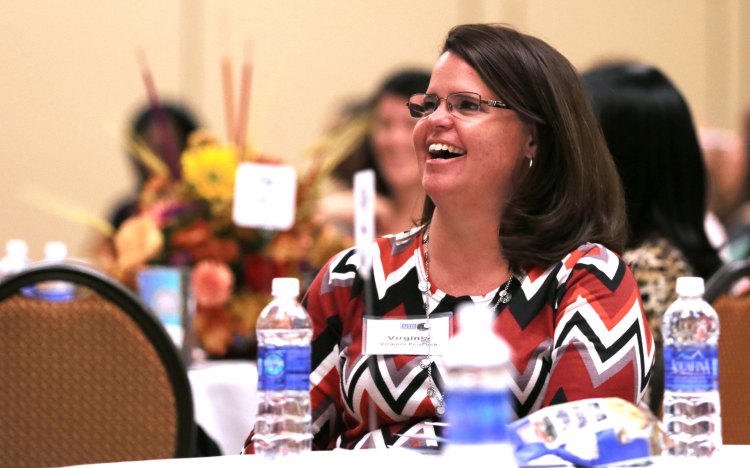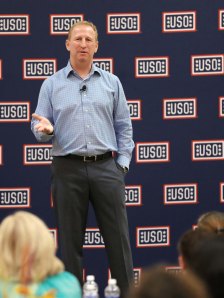[caption id=“attachment_12046” align=“alignnone” width=“750”] Virginia Peacock, an Elizabeth Dole Foundation Fellow, laughs during a presentation Thursday at the USO Caregivers Conference in Fayetteville, North Carolina. USO photo by Eric Brandner[/caption]
Virginia Peacock, an Elizabeth Dole Foundation Fellow, laughs during a presentation Thursday at the USO Caregivers Conference in Fayetteville, North Carolina. USO photo by Eric Brandner[/caption]
FAYETTEVILLE, North Carolina—When Virginia Peacock’s husband David meets another wounded combat veteran, he asks them where they were Medevaced from.
He could have been the guy on the flight taking care of them.
Now, Virginia’s the one taking care of him.
Virginia Peacock led a breakout session Thursday at the USO Caregivers Conference where she and other caregivers of wounded, ill and injured service members swapped experiences. As the current Elizabeth Dole Foundation fellow from South Carolina, Peacock devotes some of her time to advocating for caregivers’ rights and recognition. On Thursday, she reminded her peers how powerful it can be just to share their stories.
“The one thing that we are all really bad at is telling our own story,” Peacock said. “We had to be told over and over [during a lobbying trip to Capitol Hill] to stop telling our husband’s stories and start telling our own stories. … It’s a hard lesson to learn.”
The latest chapter in Peacock’s story is in its seventh year. As a registered nurse, she had a career she loved when David – a combat flight medic – was injured on his 11th and final post-9/11 deployment. His severe shoulder problems were the only aliments that stood out at first. But after a while, invisible wounds started surfacing. Memory issues. Balance problems. Suicidal thoughts.
Virginia said she tried to keep home life status quo, continuing her full-time nursing career while also caring for a now-injured husband and a young son. But with so many new challenges, her own cloud of depression set in.
She left that job and started rebuilding her family life. Now in a much better place (and back to work as a pediatric nurse with more flexible hours), she is sharing resiliency lessons with other caregivers and raising awareness for their cause.
At the top of her list: teaching caregivers to share their stories not only with political change agents, but also with someone who supports them.
“You’ve got to find your person who gets it [to share your stories with],” she said.
Building Confidence
[caption id=“attachment_12049” align=“alignright” width=“330”] Steve Shenbaum[/caption]
Steve Shenbaum[/caption]
Steve Shenbaum makes people have fun.
It’s not forced. It’s friendly.
“That’s wack,” he said in the middle of his first group game at Thursday’s USO Caregivers Conference, pausing to chuckle at himself.
“I just said wack in a presentation,” he said, momentarily breaking character and drawing belly laughs throughout the room. “Bucket list!”
Shenbaum, who founded gameon Nation in 1997, has been motivating and entertaining at USO Caregivers Conferences since the event’s inception.
It may seem counterintuitive to try to bring people who are so used to passionately advocating for an injured loved one out of their shell. And most times, he finds willing participants. But the live-action parables he brings to the group with games like 1-2-3, Dimmer Switch and Expert Speaker both lighten the mood and make caregivers think about how they’ll calibrate their attitudes and communication approaches when they get home.
“You know what’s fun?” Shenbaum asked the group “Fun is hiding and being found. Fun is taking a risk and not being bonked.”
Quotable
“Sometimes you’ve got to stop chopping wood to sharpen the ax.” –Army Col. Ron Stephens, commander of Womak Army Medical Center, addressing the general session at the USO Caregivers Conference on the importance of taking time for oneself.
Every day, America’s service members selflessly put their lives on the line to keep us safe and free. Please take a moment to let our troops know how much we appreciate their service and sacrifice.

